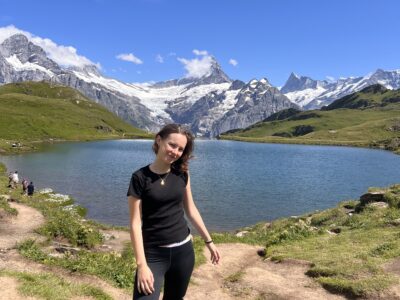By: Deborah Sachare
What to do post graduation…? This is the question on every undergraduate senior’s mind. Some will continue their higher education in graduate programs, others will head into the workforce, and a lucky few will be given the opportunity to volunteer overseas, in the Peace Corps. This semester, the Undergraduate Program in Sustainable Development was pleased to host Carey Clinton, Regional Recruiter, and BriAnne Watkins, Assessment Specialist Recruiter, of the Peace Corps at the Earth Institute as part of the Sustainability Speaker Series.
These Peace Corps representatives, who are also former volunteers themselves, provided a unique insight into the expectations and life of a Peace Corp volunteer. Carey served in Bulgaria as a Community & Organizational Development Volunteer from 2005-2007. His primary assignment was to assist with tourism and infrastructure in Veliki Preslav, Bulgaria, by working at the National Historical-Archaeological Museum in the town. BriAnne served as an Education Volunteer in Namibia between 2007-2010. Her service included teaching English and library skills at a rural primary school, as well as promoting community activities in her town by establishing an HIV support group and small sewing business for local women.
They explained that joining the Peace Corps means you are in for a 30-month commitment, including community-based, in-country training. But the work? “It’s rewarding,” said BriAnne. Over 215,000 Americans have served in one of over 65 countries that have requested assistance from the Peace Corps. There are a host of opportunities available for return volunteers, including 140 graduate programs, one of which is right here at Teacher’s College, Columbia University.
There are six main sectors that Peace Corps volunteers work in: Education, Health, Community Economic Development, Environment, Youth & Development, and Agriculture. With regard to sustainable development, about 12% of volunteers work in Environment and 5% work in Agriculture. No matter which area students volunteer in, there will always be an aspect of community development involved: “community development is the call to help, the main goal,” said Carey. While volunteers range in age from 20-79, about 94% of volunteers enter the Peace Corps holding (at least) an undergraduate degree.
International development is just one of many topics covered by the Undergraduate Program in Sustainable Development’s regularly scheduled Speaker Series for the 2014 spring semester. Topics in the Series have included environmental health and sustainable architecture. To see a full list of upcoming speakers, please visit the events section of our website. While the Speaker Series is hosted by the Undergraduate Program in Sustainable Development, all undergraduate and graduate students at Columbia and affiliated schools are invited to attend.
Columbia’s Undergraduate Program in Sustainable Development is an interdisciplinary program that addresses sustainable development through an understanding of the interaction between natural and social systems, offered through the Earth Institute in partnership with Columbia College and the School of General Studies. Participating departments and schools of the Sustainable Development major and special concentration include the Department of Earth and Environmental Biology; the Department of Earth and Environmental Engineering; the School of International and Public Affairs and the Mailman School of Public Health.
To learn more about the major and special concentration in Sustainable Development, please visit our website or contact Jessica Sotomayor, Program Manager, at jsotomayor@ei.columbia.edu.
Deborah Sachare is an intern for the Office of Academic and Research Programs at the Earth Institute. She is a student at Barnard College and will graduate in 2014 with a degree in Environmental Policy.



